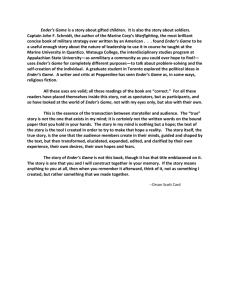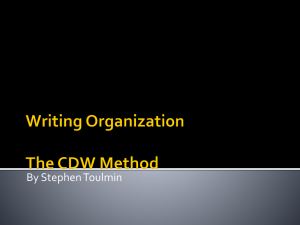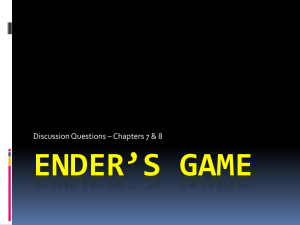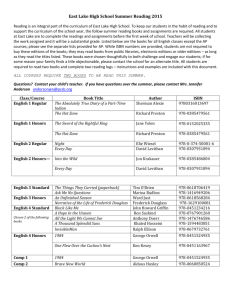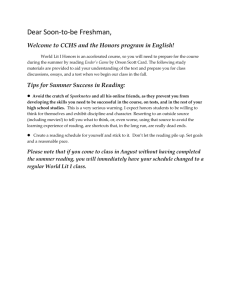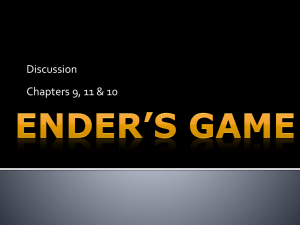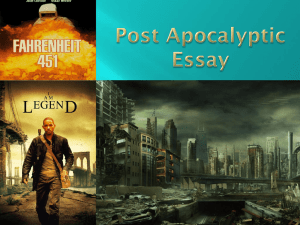Last Name First Name Last Name Ms. Landon English II October 15
advertisement
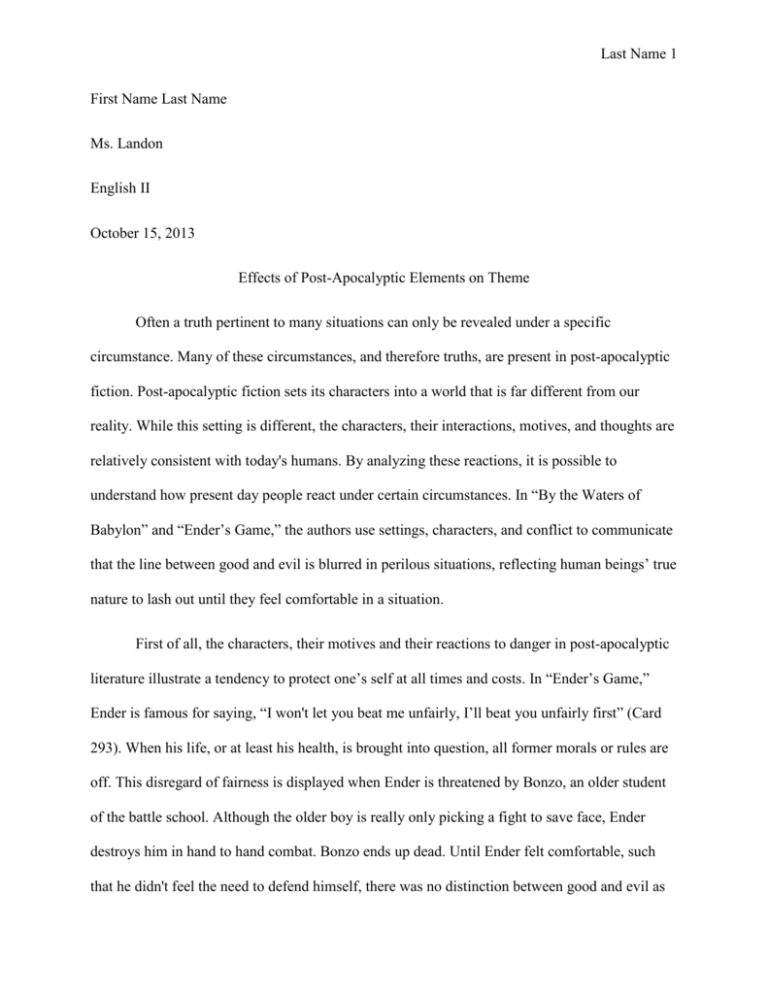
Last Name 1 First Name Last Name Ms. Landon English II October 15, 2013 Effects of Post-Apocalyptic Elements on Theme Often a truth pertinent to many situations can only be revealed under a specific circumstance. Many of these circumstances, and therefore truths, are present in post-apocalyptic fiction. Post-apocalyptic fiction sets its characters into a world that is far different from our reality. While this setting is different, the characters, their interactions, motives, and thoughts are relatively consistent with today's humans. By analyzing these reactions, it is possible to understand how present day people react under certain circumstances. In “By the Waters of Babylon” and “Ender’s Game,” the authors use settings, characters, and conflict to communicate that the line between good and evil is blurred in perilous situations, reflecting human beings’ true nature to lash out until they feel comfortable in a situation. First of all, the characters, their motives and their reactions to danger in post-apocalyptic literature illustrate a tendency to protect one’s self at all times and costs. In “Ender’s Game,” Ender is famous for saying, “I won't let you beat me unfairly, I’ll beat you unfairly first” (Card 293). When his life, or at least his health, is brought into question, all former morals or rules are off. This disregard of fairness is displayed when Ender is threatened by Bonzo, an older student of the battle school. Although the older boy is really only picking a fight to save face, Ender destroys him in hand to hand combat. Bonzo ends up dead. Until Ender felt comfortable, such that he didn't feel the need to defend himself, there was no distinction between good and evil as Last Name 2 far as his actions were concerned. “By the Waters of Babylon” also displays this theme through its characters and their interactions. As John relates, “When gods war with gods, they use weapons we do not know” (Benet). He is astounded that human beings could be so cruel and use such powerful weapons on their fellow human beings. This willingness to destroy life is brought about by the endangering of their own. It reflects how easily integrity goes out the window in an uncertain situation. Also relevant to the theme represented by post-apocalyptic fiction is the settings used by the authors. Ender Wiggin’s thoughts as he boards a space shuttle display this. “He was afraid, and fear made him serious… He walked the short bridge to the door in the shuttle. He noticed that the wall to his right was carpeted like a floor. That was where the disorientation began,” Card says, describing the beginning of Ender’s long journey (Card 28). In entering the spacecraft, Ender was entering a new world. Everything would be different. Even gravity would soon change. This made him afraid, and taciturn. When teased by a bully, he breaks a fellow passenger’s arm on accident. The unfamiliar setting causes a foreboding mood that puts Ender in a precarious situation. He decided that he didn’t know enough about his surroundings to consider them safe. The settings in “By the Waters of Babylon” also reinforce this theme. “It was very silent and sunny where I landed,” John retells (Benet). This setting creates an anxious mood. He isn’t sure what could happen. Everything seemed to be peaceful, but this was a place he had previously associated with danger. Anytime a human is nervous about something, they are more likely to make a decision they wouldn’t normally. The hostile setting influences John’s decisionmaking so that his judgment is different. “Now, though, I had long gone past what was forbidden, and I entered the likeliest towers,” John tells (Benet). Although he knows his father would punish him for the actions he is about to commit, he deems the uncertain setting reason Last Name 3 enough to continue. This changed thought process is the result of the perilous situation, and applies to how John approaches other choices. As his cognitive deliberations evolve, they naturally tend towards the primal instincts of self-preservation, which disregard all ethics. The setting of “By the Waters of Babylon” results in a change of John’s rationale toward the unpredictable. These two examples of post-apocalyptic literature clearly show how much pressure to act can be placed on a human when they believe their life could be in danger, and how this pressure leads to violence. Finally, the conflicts portrayed in post-apocalyptic literature put the characters into these situations where they feel uncomfortable. As Ender relates, “Sometimes lies are more dependable than the truth” (Card 2). Lies and conflict have become part of his life. In the rigors of battle school, where he is preparing to save the human race, the constant conflict put him on edge, so that even a loving gesture could set him off, such as when his sister is brought to him to comfort him and encourage him to continue fighting. His immediate guess was that those in charge had put her up to it. The continual conflict he has lived with hasn’t allowed him to trust anyone, so that all decisions must rely only on himself, and could only benefit himself. This reflects his nature to lash out in unpredictable positions in order to preserve himself. Also, in “By the Waters of Babylon,” John discusses the nature of truth as it relates to the happenings around him. “Truth is a hard deer to hunt,” he says. “You may die of the truth.” (Benet) His search is for the truth. It is the whole reason for his quest. Any conflicts in the short story results from part or all of truth being hidden. When truth is hidden, it only adds to the sense of unease felt by the characters. This supports their willingness to behave in ways they wouldn't if they felt totally secure, such as when John sees a dog in the city. He immediately assumes it will try to hurt him, pondering only whether he should kill it or flee. This conflict with the dog is clouded by a lack of Last Name 4 solid fact to base judgment on. The restlessness he feels from part of the truth being hidden from him affects his actions. Post-apocalyptic fiction often displays this unease through the conflicts it commonly contains. Post-apocalyptic stories share many common elements. These elements display themselves through the character’s reactions to conflict in different settings. The fact that humans react differently in danger is a fact that pertains to all situations, but can only be discovered by experience. These experiences are common in post-apocalyptic literature, resulting in a clear picture of human nature. This picture can benefit us by allowing us to better understand people around us. Last Name 5 Works Cited "By the Waters of Babylon." By the Waters of Babylon. N.p., n.d. Web. 15 Oct. 2013. <http://www2.esm.vt.edu/~sdross/text/babylon1.html>. Card, Orson Scott. Ender's Game. New York: Tor, 1991. Print.
